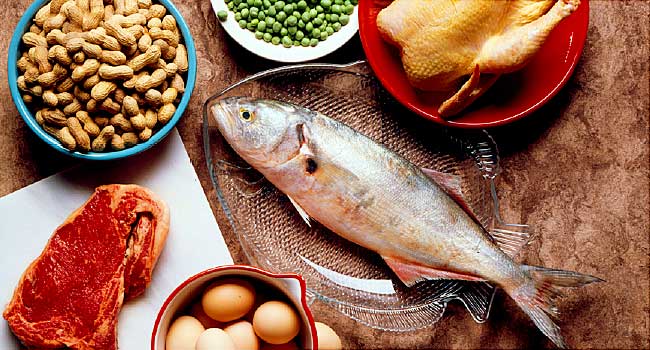


Protein is essential for everyday life, helping with muscle growth, keeping us full, and helping us lose weight. Because of this, it may seem like you can’t too much of it, but this is incorrect. While protein is a delicious and essential macronutrient, having too much in your diet can affect your overall health and your waistline.

1. You Get Bad Breath
Most people who are eating excess protein are also consuming the bare minimum of carbs. When this happens, your body begins burning your fat to produce fuel instead of relying on carbs like normal. While that is good news for your weight, it is bad for your breath. The process of burning fat produces ketones, chemicals which smell strongly in a way similar to nail polish remover. Since the smell comes from within, even brushing, rinsing, and flossing won’t help.
2. You Damage Your Kidneys
As you eat protein, you consume nitrogen byproducts which your kidneys then filter out from your bloodstream. With a normal amount of protein in your diet, the nitrogen leaves your body through your urine and you are fine. With excessive amounts of protein, however, your kidneys have to work much harder than normal to remove the extra nitrogen, something that can lead to kidney damage.
3. You Develop GI Issues
Protein provides almost nothing in the way of fiber, particularly if you choose the wrong proteins. Remember that your digestive system needs fiber to keep you regular. Swapping out complex carbs with fiber such as fruit, vegetables, whole grains, and beans for animal proteins will leave you coming up short of your 25 or 35 grams of daily fiber. This leads to bloating, constipation, and other GI symptoms.
4. You Experience Weight Gain
In the short run, eating a lot of protein will indeed help you lose weight. The problem, however, is if you just add protein to your diet without getting rid of other items you were eating. A study looking at 7,000 adults over the long term confirmed this. In the study, those with the highest protein consumption had a 90 percent greater chance of becoming overweight.
5. Your Mood Slumps
Eating too much protein can also leave you grumpy, cranky, and tired. This goes back to the lack of carbohydrates which are your body’s main fuel source and a big source of energy for the brain.
Without carbs, your energy will drop as your body enters ketosis, the state where you burn fat to create fuel. This is particularly noticeable right when you make the change. Remember that carbohydrates also stimulate production of serotonin, your “feel good” hormone.
6. You Develop Nutritional Deficiencies
If you are eating an excessive amount of protein, then you probably don’t eat enough other items, both in terms of nutritional sources and varied food groups. Other foods you probably won’t eat enough of include fresh produce and whole grains which deliver vitamins and minerals and seeds and nuts that deliver healthy fats. These deficiencies can lead to compromises to your immune system, dry hair and skin, and energy loss.
7. You Reduce Brain and Liver Function
Eating too much protein can also harm your nervous system, brain, and liver. As you eat protein, your body will produce ammonia which is a toxin but your liver makes it harmless.
If you eat more protein than you should, your liver may become overworked. This in turn can lead to the buildup of ammonia as well as other toxic substances in your bloodstream. That may cause encephalopathy which includes a decline in your nervous system and brain function.
8. You Develop High Cholesterol
Unfortunately, a lot of high-protein foods, especially those from animal sources, have high levels of cholesterol. This can lead to hardened arteries and related serious conditions, including stroke and heart attack.
The National Heart, Lung, and Blood Institute suggests having just 200 mg of cholesterol daily. Half of a roasted chicken breast and a 6-ounce broiler porterhouse steak have 83 and 126 mg respectively, and are common protein sources.
9. You Become Dehydrated
Breaking down protein requires your body to use extra water and then it needs more to remove waste that gets left behind. Because of this, eating too much protein without increasing your water intake can lead to dehydration. The good news is that this side effect is rare if you are healthy.
The average person should have between 40 and 70 grams of protein daily. Only pregnant women and athletes who are exercising aggressively will need around 25 percent more. The general suggestion is 46 grams of protein for women and 56 grams for men a day.
Where to Get Protein
You may be surprised to learn how much protein is in a small amount of food. Meat, eggs, fish, dairy, seeds, nuts, and legumes can all contain protein. This table will give you a good idea of how much protein the most common sources have:
| Source |
Protein |
|
Red meat, seafood, pork, poultry |
6 – 9 g per ounce |
|
Eggs |
6 – 8 g per egg |
|
Nuts and seeds |
4 – 8 g per quarter cup |
|
Cooked beans |
7 – 8 g per half cup |
|
Cooked grains |
5 – 7 g per cup |
|
Vegetables |
1 – 2 g per ounce |
Avoid Eating Just Plant-Based Foods
If you just get protein from plant-based foods, you may develop deficiencies. Instead, try to choose high-quality proteins from plant and animal sources.
Be Selective About Your Meat
In terms of protein and overall health, both quality and quantity of meat matter. When possible, opt for organically raised meats that were grass fed and pastured. Follow the same rule for eggs and dairy.